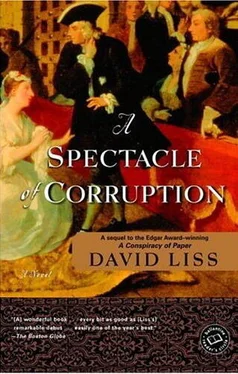David Liss - A Spectacle Of Corruption
Здесь есть возможность читать онлайн «David Liss - A Spectacle Of Corruption» весь текст электронной книги совершенно бесплатно (целиком полную версию без сокращений). В некоторых случаях можно слушать аудио, скачать через торрент в формате fb2 и присутствует краткое содержание. Жанр: Современная проза, на английском языке. Описание произведения, (предисловие) а так же отзывы посетителей доступны на портале библиотеки ЛибКат.
- Название:A Spectacle Of Corruption
- Автор:
- Жанр:
- Год:неизвестен
- ISBN:нет данных
- Рейтинг книги:5 / 5. Голосов: 1
-
Избранное:Добавить в избранное
- Отзывы:
-
Ваша оценка:
A Spectacle Of Corruption: краткое содержание, описание и аннотация
Предлагаем к чтению аннотацию, описание, краткое содержание или предисловие (зависит от того, что написал сам автор книги «A Spectacle Of Corruption»). Если вы не нашли необходимую информацию о книге — напишите в комментариях, мы постараемся отыскать её.
This sequel to Liss's Edgar Award-winning A Conspiracy of Paper (2000) brings back ex-pugilist Benjamin Weaver and his 18th-century London environs in all their squalid glory. Benjamin has become a "thieftaker," a sort of bounty hunter/private eye, and is investigating the simple case of a threatening letter when he is caught up in a riot, accused of murder and sentenced to hang. After a gutsy escape, he sets about unraveling the mystery of who framed him and why. Donning the disguise of a wealthy coffee planter from Jamaica, Benjamin infiltrates the upper classes, where he encounters a plot centering on a hotly contested House of Commons election. There is much explanation (perhaps too much) of the history and philosophies of the Whig, Tory and Jacobite parties, but this is nicely balanced with Benjamin's forays into London's underbelly, where he has his way with the ladies and dodges dangerous louts looking to kill him. The real fun is the re-creation of the streets of London ("He fell into the alley's filth-the kennel of emptied chamber pots, bits of dead dogs gnawed on by hungry rats, apple cores and oyster shells") and the colorful denizens thereof. Many hours are spent in innumerable coffeehouses, with Benjamin and company imbibing coffee, chocolate, ale, wine and that great destroyer of the poor, rotgut gin, and employing such useful swear words as "shitten stick," "arse pot" and "bum firking." Mystery and mainstream readers with a taste for gritty historical fiction will relish Liss's glorious dialogue, lively rogues, fascinating setting and indomitable hero. (Mar.) Forecast: The many readers who loved Liss's first book have been eagerly awaiting a sequel. Booksellers can recommend both of the Benjamin Weaver books to those who enjoy Bruce Alexander's Sir John Fielding mystery series. Copyright 2003 Reed Business Information.
Library Journal
Having survived the dangerous intrigues and nefarious plots surrounding his father's death and the business of the South Sea Company (A Conspiracy of Paper), Benjamin Weaver, former pugilist and thief taker extraordinaire, is once again plunged into the world of electioneering and political corruption in Georgian London. This time, he seeks to clear his name and save his own life after being wrongly accused of killing a dock worker. Forced to assume the disguise of a Jamaican tobacco plantation owner, he moves from the drawing rooms of Westminster to the hovels of Wapping in search of the true murderer, uncovering corruption at all levels, from perjured witnesses to bribed judges to treasonous Jacobites. While it does not resonate as richly as A Conspiracy of Paper, this novel will still delight readers with its picture of a London familiar to fans of Boswell and Defoe. [Previewed in Prepub Alert, LJ 11/1/03.]-Cynthia Johnson, Cary Memorial Lib., Lexington, MA Copyright 2004 Reed Business Information.
Kirkus Reviews
With eloquent wit, Liss manipulates the concepts of misdirection and probability theory in his serpentine third novel (after The Coffee Trader, 2003). Once again, we meet the unconventional protagonist of the author's Edgar-winning debut A Conspiracy of Paper (2000). "Thief-taker," retired prizefighter, and Jew Benjamin Weaver, as resourceful a former rogue as ever, is in peril again-falsely convicted and sentenced to hang for the murder of a dockworker and labor leader whom he barely knew. The year is 1722, and London is abuzz over England's first General Election, vigorously contested by conservative Tories who support Hanoverian King George I and antiroyalist Whigs, who may or may not be in league with Jacobites plotting the restoration of deposed "Pretender" James II of Scotland. Weaver escapes from Newgate Prison (in a marvelously detailed sequence), and, while laboring to clear his name, assumes multiple disguises and forms affiliations with several members of London's political, ecclesiastical, and criminal elites. These include the woman he loves unrequitedly, his cousin's widow Miriam, and her husband, Whig Parliamentary candidate Griffin Melbury; duplicitous parish priest Christopher Ufford (in whose service suspicion for murder had fallen on Weaver); brutal tobacco merchant Dennis Dogsmill and his fetching sister Grace, and numerous other power brokers and ruffians whose allegiances and very identities are seldom what they seem. The dazzling plot, which grows steadily more intricate and circuitous, turns on the allegation that "there [is] a Tory spy among the Whigs," and the likelihood that Weaver's victimization is connected to the election that the charismatic Melburyblithely characterizes as "a spectacle of corruption." Liss's impressive research provides a wealth of information about 18th-century politics, emergent labor organizations, and gradations of etiquette and malfeasance among contrasting social levels. And Weaver's somber, wry, knowing narrator's voice is a deadpan delight. Furthermore, it all ends with yet another twist that seems to promise we'll hear more from-and of-the indefatigable Benjamin Weaver. Let's hope so.














